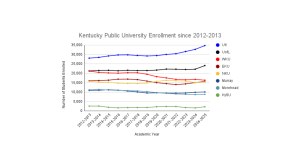Price on Politics: Kentucky’s charter school bill
April 5, 2022
On March 1, House Bill 9 was introduced on the floor of the Kentucky House of Representatives. In the weeks since it has been introduced, it has created debate not only on the floor of the House, but throughout the Commonwealth’s public education employees and advocates.
The bill’s summary outlines the proposed provisions. Among them is a provision to “make public charter schools eligible for federal and state grants, require the commissioner of education to apply for all federal funding that supports charter school initiatives, determine the distribution of public charter school assets upon closure, and authorize the Kentucky Board of Education to promulgate regulations for the calculation and distribution of funds to public charter schools.”
The bill gives public school districts the ability to decide whether a charter school would be allowed within the district while also outlining the appeal process for the charter schools if they are denied access.
The bill has passed the House and Senate both along party lines and is headed to Governor Beshear’s desk. It passed the House after a 51-46 vote and the Senate after a 22-14 vote.
In researching this bill, I had to first define what a charter school was. According to the National Alliance for Public Charter Schools, “Charter schools are independently-operated public schools that have the freedom to design classrooms that meet their student’s needs.”
Charter schools are free to design their own curriculum based on whatever values the schools’ organizers see fit. Under HB 9, this would still happen. They would not be bound by whatever a public school district is bound by in terms of the content they teach students.
This is the most important concept for charter schools. They are free to teach whatever they want to their students. The NAPCS states that “the possibilities are endless, but charter schools aim to provide a range of options so that parents can choose the public school that best fits their child.”
It is this independence that has worked for charter schools for so long. Parents have the choice whether to send their children to public schools in public school districts or to charter schools. Because they are independent, charter schools are responsible for raising their own funds to use however they see fit.
HB 9 would require the state and local school boards to appropriate federal funding to charter schools, as well. This simply cannot happen.
Public school districts around the Commonwealth already struggle to get the necessary funding needed to provide the best education for their students. From textbooks to technology to teachers’ salary to the buildings themselves, something falls short in many school districts.
This isn’t to say that the level of education is poor. In Kentucky, teachers, administrators, and other public school employees are some of the most admirable people out there. They are dedicated to their students, always giving their best to provide each and every opportunity they can.
They build relationships with young people that they need. Whether it be a teacher-student relationship or filling a parental void in the life of a student, they can be some of the most important people during the development of children.
Taking what little funding schools receive and giving it to charter schools hurts possibilities for growth.
Giving funding to programs that fail is not something that the Kentucky State Legislature should do.
Charter school advocates say that they provide better opportunities for performance, but this has not been proven to be the case. The National Conference of State Legislatures cited a study done by Mathematica Policy Research and funded by the US Department of Education, which found that “on average, charter middle schools that hold lotteries are neither more nor less successful than traditional public schools in improving student achievement, behavior, and school progress.”
The NCSL also cites other studies which have found that only 17% of charter schools have shown academic improvement. The claim that charter schools perform better than public schools has not been proven.
If the Commonwealth’s legislators feel any sense of responsibility to the children of the Commonwealth, this bill cannot be sent to Governor Beshear’s desk. Public schools are the backbone of this state’s–and this nation’s–future. They have produced countless leaders and will continue to produce the best and brightest members of society.
Public schools provide safe havens for some students and springboards to better futures for all. Taking away from institutions will hurt not only the quality of education received by students, but the chances for them to succeed, as well.
As funding is cut, unique programs and after-school opportunities will, as well. If the Kentucky State Legislature cares at all about young people, they will take cues from the large numbers of parents and public school teachers that oppose this bill. They will not divert necessary funding from public schools to charter schools that have not been proven to be effective.
In passing this bill, legislators will once again prove their disinterest in the futures of their children and any later generations.
Commentary writer Price Wilborn can be reached at [email protected]. Follow him on Twitter @pricewilborn.















